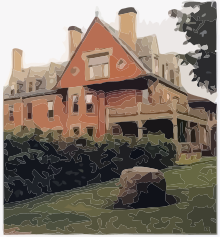This article includes a list of references, related reading, or external links, but its sources remain unclear because it lacks inline citations. (September 2008) |

The phrase Zen center was coined by American students of Shunryu Suzuki in the mid-twentieth century, and the San Francisco Zen Center became the first Zen center, incorporating in 1962. Neither temples nor monasteries (although at times operating such facilities), Zen centers occupy a unique place in the historical development of Zen Buddhism and of Buddhism in the United States.
As Zen practice has expanded throughout the United States over the last fifty years, the variety of Zen centers has increased. While some are now the homes of wealthy communities in major cities (such as Zen Center of Los Angeles), and some are in traditional mountain settings (such as Yokoji Zen Mountain Center or Centro Zen in Puerto Rico), other Zen centers have either humble or no permanent physical location - meeting in members' private homes, university classrooms, and Quaker Meeting Houses to name but a few examples. While large and established Zen centers may serve as the residence of priests, monks, and lay people, smaller and more rural Zen centers may have no ordained members. Although some recent studies have been made regarding Zen in America, the area remains under researched, and still quite heterogeneous.